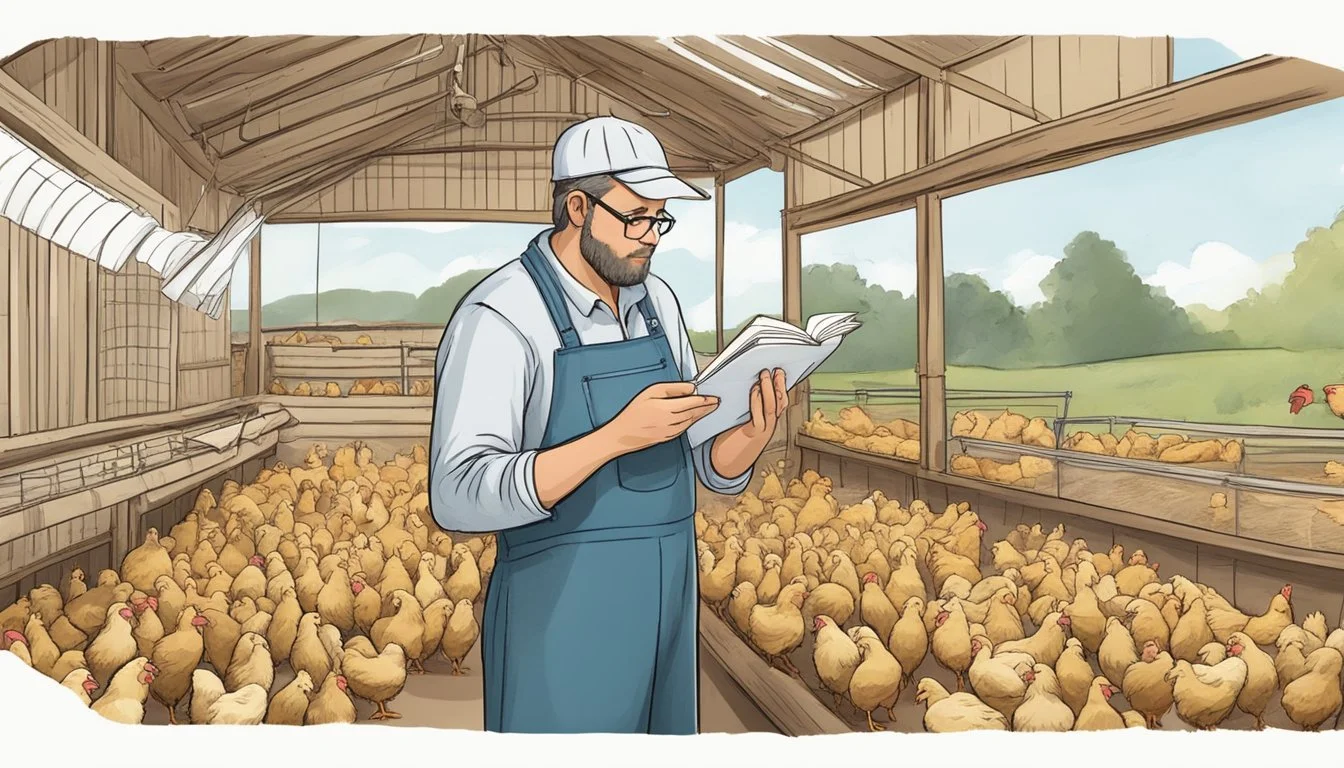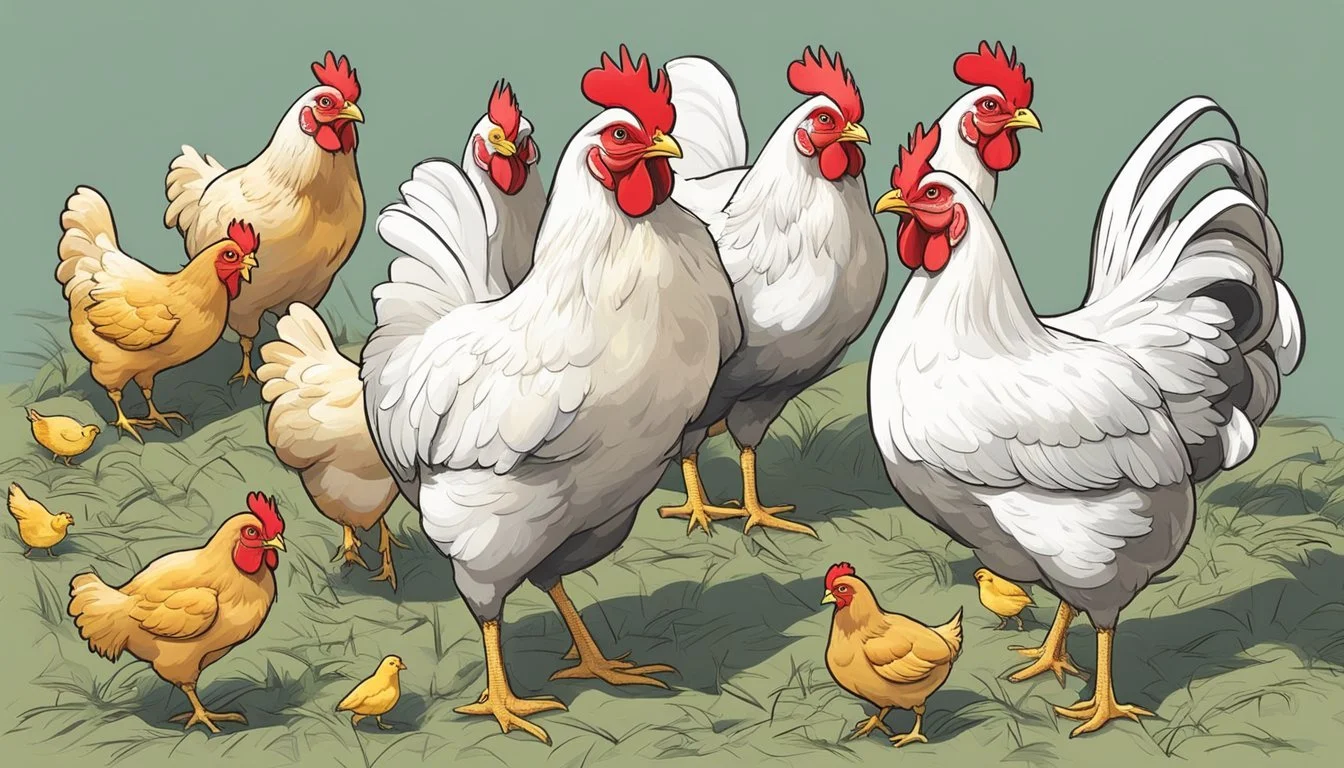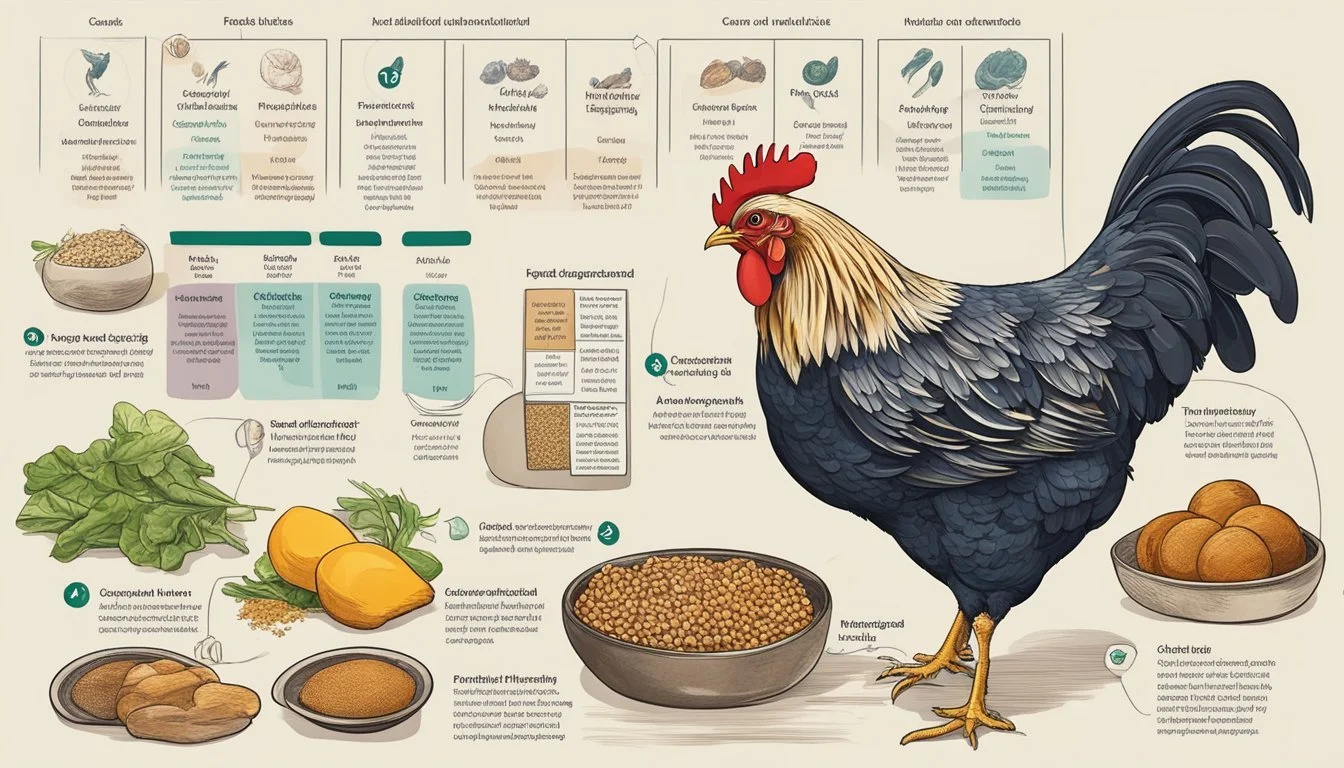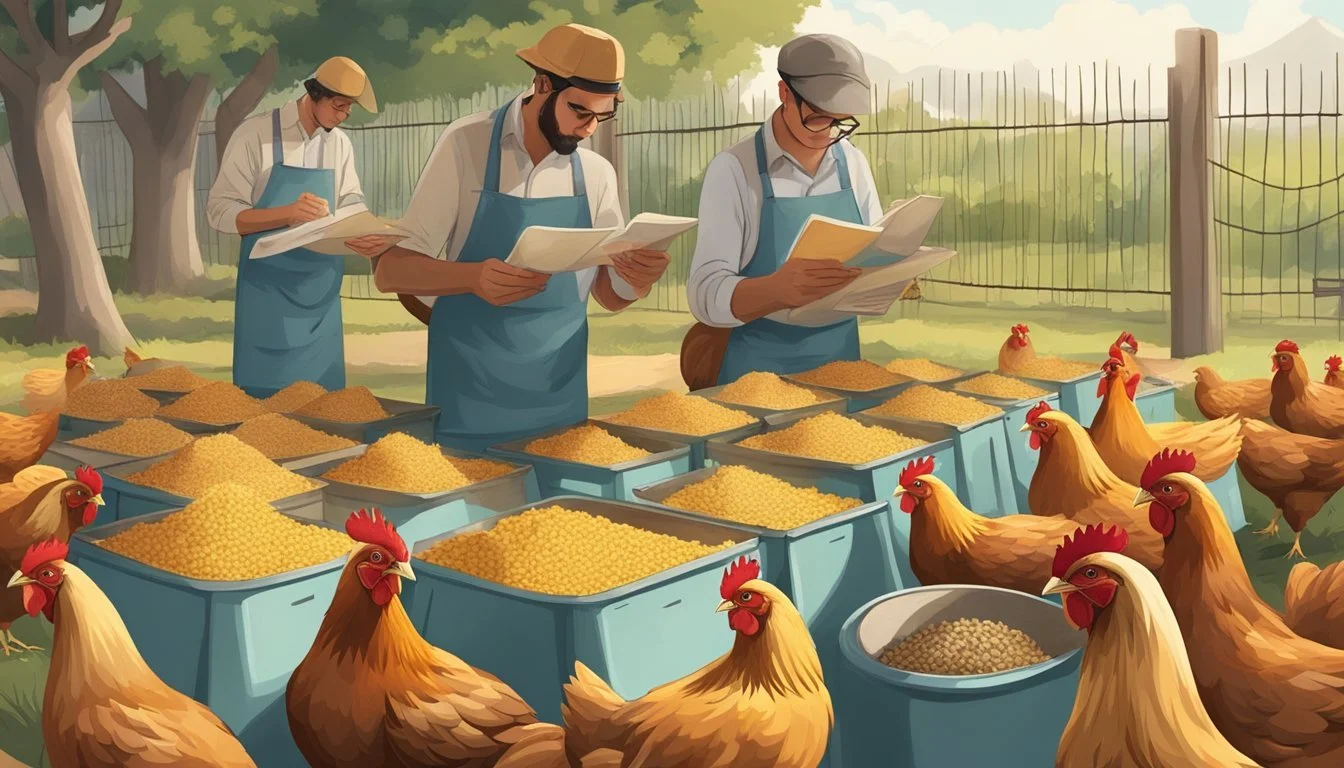How do I Identify and Manage Nutritional Deficiencies in Chickens
Essential Guidelines
Identifying and managing nutritional deficiencies in chickens is crucial for maintaining their health and productivity. Proper nutrition is not only essential for the growth and development of poultry but also for their overall well-being and resistance to diseases. When chickens are nutritionally deficient, they can exhibit a variety of symptoms, such as poor feather quality, decreased egg production, skeletal problems, and general lethargy. These signs often point to imbalances or insufficiencies in vitamins, minerals, and other key nutrients that play pivotal roles in avian physiology.
To effectively address nutritional deficiencies, poultry owners need to be vigilant in observing their flock and knowledgeable about the dietary requirements of chickens. It involves understanding the specific needs of different breeds and life stages, as the nutritional demands of layers differ from those of meat birds or growing chicks. Furthermore, the quality of the feed, including the balance of proteins, vitamins, and minerals, significantly impacts the flock's health. Early detection and prompt management of nutritional shortfalls prevent long-term health issues and supports the productivity of the flock.
Understanding Chicken Nutrition
Proper chicken nutrition is foundational for optimal poultry health and productivity. Knowing which nutrients are essential and how to provide a balanced diet is key to managing the well-being of chickens.
Essential Nutrients for Poultry Health
Chickens require a mix of vitamins, minerals, carbohydrates, proteins, fats, and water to maintain their health. Each nutrient plays a critical role:
Vitamins such as vitamin A, vitamin E, and vitamin D are essential for vision, immunity, and calcium absorption.
Minerals like calcium contribute to bone structure and are essential for proper egg production.
A balance of carbohydrates and fats provides the energy necessary for daily activities and to support growth and metabolism.
Proteins are crucial for muscle development and overall bodily functions.
Adequate water intake is crucial to all life processes inside chickens.
The Role of a Balanced Diet in Chicken Health
A balanced diet ensures that chickens receive all the necessary nutrients in the right proportion.
Appropriate feeds should incorporate a mix of grains, seeds, and formulated feed to deliver a complete spectrum of nutrients.
Integrating a variety of feeds ensures a diversity of vitamins and minerals crucial for maintaining a strong immune system.
A well-planned diet supports effective egg production, strong skeletal development, and optimal growth rates.
Balanced nutrition directly influences a chicken's metabolism and overall health, impacting their productivity and longevity.
By focusing on the requirements of poultry nutrition, owners can significantly influence the physical health and productivity of their chickens.
Recognizing Nutritional Deficiencies
In chickens, nutritional deficiencies can seriously impair health. Recognizing these deficiencies early is crucial for prompt management and correction.
Common Signs and Symptoms
Chickens displaying general signs of stress such as changes in behavior or reduced egg production may be experiencing nutritional deficiencies. Common symptoms include weakness, dull feathers, and a noticeable reduction in the weight or growth rate. Sometimes, the condition may not be evident until the bird is subjected to the stress of a disease or high production demands.
Weakness or lethargy in birds
Poor feather quality, including brittleness
Decreased egg production in laying hens
Reduced growth rates in young chickens
Specific Nutrient Deficiency Indicators
Each nutrient deficiency often presents specific indicators that range from the bird's physical appearance to their behavior.
Vitamin A deficiency: Symptoms could manifest as reduced growth, weak legs, and edema. Chickens might also show changes in their feathers and beak quality.
Vitamin D deficiency: This can lead to rickets in young chickens and osteoporosis in laying hens, thereby affecting their ability to lay eggs effectively.
Vitamin E deficiency: Symptoms of a Vitamin E deficiency include encephalomalacia (crazy chick disease) and muscular dystrophy.
Vitamin K deficiency: A deficiency here could result in increased bleeding and bruising, indicating issues with blood coagulation.
Calcium deficiency: Manifests as weak egg shells in laying hens or poor bone development. Hence, balancing calcium ratios is essential to prevent imbalance and related issues.
Selenium deficiency: Low selenium can lead to conditions such as exudative diathesis and nutritional muscular dystrophy.
Iron deficiency: Though less common, an iron deficiency can result in anemia, especially in fast-growing chicks.
By closely monitoring these indicators, poultry owners can take measures to address nutritional deficiencies before they evolve into serious health problems.
Diagnosing and Treating Deficiencies
Diagnosing nutritional deficiencies in chickens is crucial as it can prevent diseases, aid in recovery, and ensure proper nutrition. Addressing these deficiencies involves both professional veterinary assessment and implementing targeted nutritional strategies.
Professional Assessment by a Vet
A vet can diagnose deficiencies through a physical examination and laboratory tests, such as a complete blood count (CBC), to assess for issues like anemia and improper blood clotting. They will look for signs that could indicate an imbalance in nutrients or problems with nutrient absorption. In chickens, stress or illness can lead to decreased absorption of nutrients from their food, exacerbating deficiencies. A thorough assessment by a vet can pinpoint the specific nutrients that are lacking and need to be addressed.
Nutritional Recovery Strategies
Following a proper diagnosis, the recovery plan should focus on restoring balanced nutrition. This often involves:
Adjusting the diet: Incorporating a variety of foods that are high in the missing nutrients. For example, a deficiency in vitamin K, critical for blood clotting, might require the addition of leafy greens or vitamin K supplements to their feed.
Supplementation: Administering vitamins and minerals directly, either via injections or water-soluble products, to quickly correct deficiencies.
Monitoring water intake: Ensuring chickens have access to clean water, as water is essential for nutrient absorption and overall health.
Reducing stressors: Minimizing environmental stress that can affect digestion and nutrient absorption in chickens.
Implementing these strategies effectively guides chickens towards a swift nutritional recovery. The goal is to return to a state of nutritional balance without creating excess, which can be equally harmful.
Sources of Nutrients for Chickens
Identifying and providing the proper sources of nutrients for chickens is key to maintaining their health and improving their productivity. This section outlines the various types of nutrient sources ranging from natural foods to commercial formulations that ensure a well-rounded diet.
Natural Food Sources
Chickens scavenge for natural food sources like seeds, insects, and plants that supply many necessary nutrients. A balanced diet includes plant-derived materials which are rich in vitamins and minerals, as well as animal-based proteins such as insects that provide essential amino acids. For laying hens, the addition of calcium-rich materials like oyster shell helps to strengthen eggshells.
Supplementation and Commercial Feeds
Commercial feeds are formulated to meet the nutritional requirements of poultry at various stages of development. These feeds typically consist of a blend of grains like corn, proteins from sources like fish meal or soybeans, and a vitamin premix essential for growth and health. For young chicks, a high-protein diet is vital for their rapid growth, necessitating a starter feed rich in amino acids. For layers, feeds should also focus on a balanced diet inclusive of fat-soluble vitamins to support egg production.
Treats and Dietary Additions
While the primary diet should be well-balanced, chickens can receive treats and dietary supplements in moderation. Scraps from kitchen waste can contribute variety but should not replace formulated chicken feed. Treats like mealworms can give a protein boost, and items like fish or lean meat scraps can be a source of fats and additional nutrients. However, it is critical to ensure treats are not high in fat or salt to avoid any nutritional imbalances.
Preventing Nutritional Imbalances
Ensuring that chickens have access to a well-balanced diet is crucial for preventing nutritional imbalances. An ideal diet includes the right amounts of proteins, carbohydrates, fats, calcium, and essential vitamins to support immune system function, promote healthy growth, optimize egg production, and maintain overall health.
Benefits of a Well-Balanced Diet
A balanced diet for chickens lays the foundation for their wellbeing. Adequate protein intake aids in muscle development and feather growth, which are necessary for temperature regulation and mobility. Healthy amounts of carbohydrates provide energy for daily activities. Sufficient calcium content is vital for bone strength and high-quality eggshells. Moreover, a diet rich in vitamins and minerals supports the immune system, mitigates the risk of vitamin deficiencies, and contributes to effective health maintenance.
Managing Feed Intake and Diet Variations
It is important to monitor and manage the chickens' feed intake over time to avoid issues like weight loss or excess weight gain. Adapting feed composition with age and production cycles is essential. For instance, layers require different nutritional content in their diet than meat breeds or growing chicks. Introducing diet variations cautiously is necessary to prevent gastrointestinal upsets. Regularly evaluate the feed quality and freshness to ensure it meets the nutritional standards and adjust the diet as needed for optimal health and production.
Integrating Nutrition with Overall Chicken Care
Ensuring proper nutrition is pivotal to the health and productivity of poultry. Proper dietary management can significantly influence growth, egg production, and the overall well-being of chickens.
Considerations for Different Life Stages
At each life stage, chickens require specific nutrients to thrive. Chicks need a diet high in protein to support rapid growth. Starter feeds are typically rich in protein and essential amino acids like methionine. As they transition into laying hens, the focus shifts to maintaining a balanced diet with adequate calcium for strong eggshell formation, as well as vitamin D3 to facilitate calcium absorption.
For broiler chickens, the diet must support quick muscle development while preventing health issues related to accelerated growth. Their feeds should provide high energy levels, sourced from carbohydrates and fats, while ensuring enough protein to support muscle development without overstressing the birds.
Monitoring and Adjusting Nutritional Plans
Continuous monitoring of the chickens' health and growth progress is essential. Observing the flock for signs of nutritional deficiencies is key, including checking for poor feather quality, reduced egg production, or stunted growth. Making adjustments to their diet based on these observations is critical.
If faced with stress from environmental factors, chickens may require an adjusted diet with increased nutrient densities to counteract energy deficits. ItalicAdjusting their feeds accordingly can help mitigate these issues and restore balance to their nutrition_. Regular weighing and condition scoring can inform such dietary tweaks, ensuring chickens receive the nutrition they need throughout their lives.
Effects of Environmental Factors on Nutrition
Environmental factors play a crucial role in shaping the nutritional needs and metabolism of chickens. Variances in temperature, stress levels, and disease presence can significantly affect their energy needs and immune system, requiring adjustments in their dietary plan.
Impact of Stress and Disease on Nutritional Needs
Chickens exposed to high stress are more susceptible to diseases, which can compromise their immune system. Stress can come from various environmental sources such as poor housing, overcrowding, and predator threats. When chickens are stressed, their metabolic rate may increase, leading to higher energy demands to maintain homeostasis. These heightened energy needs require careful management, primarily through increased nutrient-rich food intake designed to fortify their resistance against illness and keep them healthy.
Temperature and Seasonal Changes
The temperature in a chicken's environment directly influences their metabolism and energy requirements. During cold weather, chickens expend more energy to maintain body heat, thus increasing their caloric needs. Conversely, high temperatures reduce feed intake, which can lead to nutrient deficiencies if not adequately addressed. It's essential to adjust their diets accordingly during extreme seasonal changes to ensure they receive the proper amount of nutrients and maintain optimal growth and production rates.
Managing a chicken's energy balance is key, as inadequate nutrition during pivotal times of temperature fluctuation can have detrimental effects on their overall health and productivity.
Addressing Excesses in Chicken Diets
Managing the dietary intake of chickens is crucial to prevent the over-supplementation of nutrients and the associated health issues. An excess of certain nutrients, particularly fat-soluble vitamins and minerals such as vitamin A, vitamin D, and calcium, can lead to toxic effects and serious health complications.
Identifying and Correcting Over-Supplementation
Chickens receiving excessive supplements in their diets might display signs of toxicity, such as lethargy or changes in skin and bone structure. Excessive vitamin A can result in swollen joints and decreased growth, while too much vitamin D can lead to abnormal calcium deposits in soft tissues. It's essential to:
Monitor the flock's behavior and physical condition.
Assess the feed for excess levels of fat-soluble vitamins.
Adjust their diet to reduce the intake of the overly abundant nutrients.
Consult with a veterinary nutritionist to establish a balanced diet plan.
Handling overweight and related health problems necessitates a thorough understanding of the birds' need for weight loss and the implementation of appropriate interventions. Chickens with excessive weight can develop issues like fatty liver syndrome, which can be fatal if not managed properly. To combat these issues:
Implement a controlled feeding program to manage caloric intake.
Avoid high-energy feeds that contribute to weight gain.
Encourage regular exercise by providing ample space and stimuli.
Monitor and adjust the diet to promote gradual, healthy weight loss.
Taking corrective actions to resolve dietary excesses helps in maintaining the overall health and productivity of chickens. Proper dietary management can prevent extreme outcomes, including death, associated with nutritional imbalances.
Advanced Nutritional Considerations
Identifying and managing nutritional deficiencies in chickens requires a comprehensive understanding of their dietary needs, including trace minerals, vitamins, and the optimization of nutrient uptake. The focus is on the specific roles these nutrients play and methods to enhance feed efficiency and absorption.
Role of Trace Minerals and Vitamins
Chickens require a balanced diet that includes both trace minerals and vitamins for optimal health and productivity. Trace minerals such as zinc, copper, and magnesium are essential for various metabolic processes, including bone formation, enzyme function, and the maintenance of feather health. It is crucial that chickens receive these minerals in appropriate amounts, as an imbalance can lead to deficits or toxicities. For example, zinc plays a significant part in over 300 enzymatic reactions, and a deficiency can result in poor feathering and skeletal issues.
Similarly, vitamins are vital for many bodily functions, with water-soluble vitamins such as B-complex and vitamin C being essential for the metabolism of nutrients. Vitamin deficiencies in chickens can manifest in a range of health issues—from weakened immune response to poor growth rates—emphasizing the importance of a well-rounded diet.
Optimizing Feed Efficiency and Absorption
Feed efficiency refers to the chickens' ability to convert feed into body weight, which is influenced by the diet's nutritional composition and the absorption of nutrients. Proper absorption ensures that chickens utilize all the nutrients they consume, allowing for healthy growth and egg production. Enhancing the diet with specific nutrients like phosphorous and magnesium can improve bone strength and eggshell quality. Additionally, the presence of adequate potassium is necessary for cellular function and water balance.
Strategies for optimizing nutrient absorption include using prebiotics and enzymes in the feed to enhance gut health and ensuring that chickens have continuous access to clean water, as hydration plays a significant role in nutrient uptake. Feed should be formulated based on age, production level, and health status of the flock to address specific nutritional requirements.
Dealing with Disease-Related Nutritional Challenges
In managing chickens with diseases, the focus is on overcoming nutrition-related issues that compound their condition. Ensuring proper nutritional support and supplementing with vitamins can be crucial for their recovery process.
Nutritional Support for Sick Birds
When chickens suffer from diseases, their nutritional needs may change. Diseases such as encephalomalacia can cause weakness or paralysis due to specific nutrient deficiencies, often leading to poor recovery outcomes. Owners must monitor their chickens for lethargy or watery discharge which can further indicate the severity of their nutritional deficits. A tailored diet that meets increased energy and nutrient demands can help sick birds maintain their strength, support their nervous system, and reduce diarrhea.
Vitamin and Nutritional Supplements during Illness
Supplementing a chicken's diet with specific vitamins and nutrients during illness can be imperative to their health. Vitamin B1 is vital for proper nervous system function; a deficiency can lead to encephalomalacia, characterized by a high-step gait or circling movements in chickens. Vitamin C plays a role in stress reduction and is a cofactor in the synthesis of neurotransmitters. It may aid in reducing hemorrhage and combating anemia in sick birds. Therefore, providing supplements that include these vitamins can assist significantly in the healing process.
Final Considerations
Managing nutritional deficiencies in chickens necessitates a multifaceted approach that includes both immediate interventions and long-term strategies. To ensure optimal chicken health, it's imperative to focus on both prevention and management through regular health check-ups and the formulation of a sustained, balanced diet plan.
Regular Check-Ups and Disease Prevention
Routine health screenings play a pivotal role in the early detection of nutritional deficiencies in chickens. It's recommended that they undergo these screenings by a qualified veterinarian. Blood tests, for example, can help detect a shortage in essential nutrients such as riboflavin, which is vital for growth and hatchability. Consistent monitoring helps in promptly identifying signs of malnutrition, enabling swift action to correct dietary imbalances before they contribute to long-term health issues.
Long-term Nutritional Strategies
Developing and implementing a balanced diet is key to preventing nutritional deficiencies and promoting long-term health in chickens. A diet that adequately meets their nutritional needs is necessary for maintaining overall health and ensuring efficient disease prevention. Nutrition planning should involve a variety of foods including grains, proteins, and greens, to provide a comprehensive range of vitamins and minerals. Adjusting their diet according to different life stages—such as growth or laying periods—is also essential for maintaining their health maintenance.






